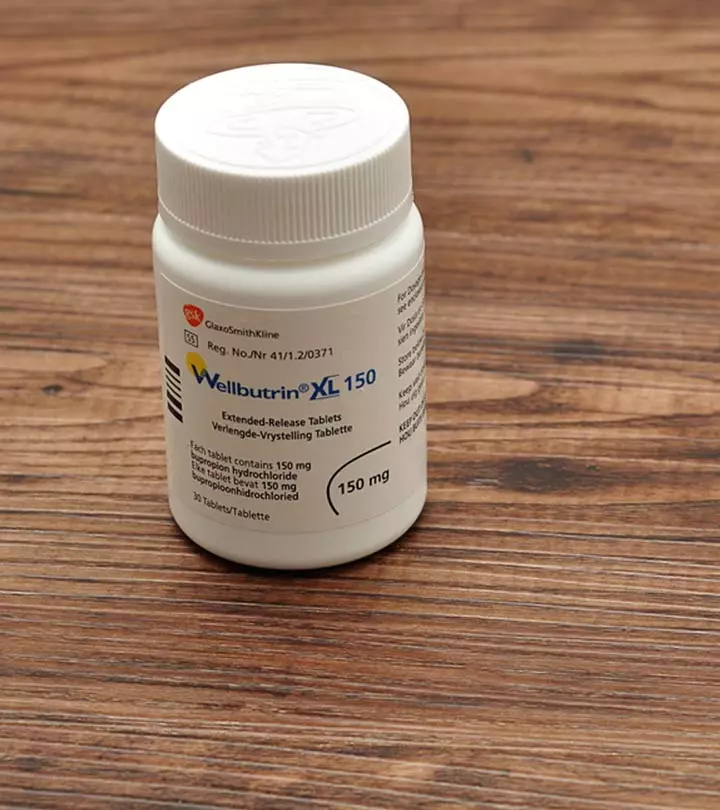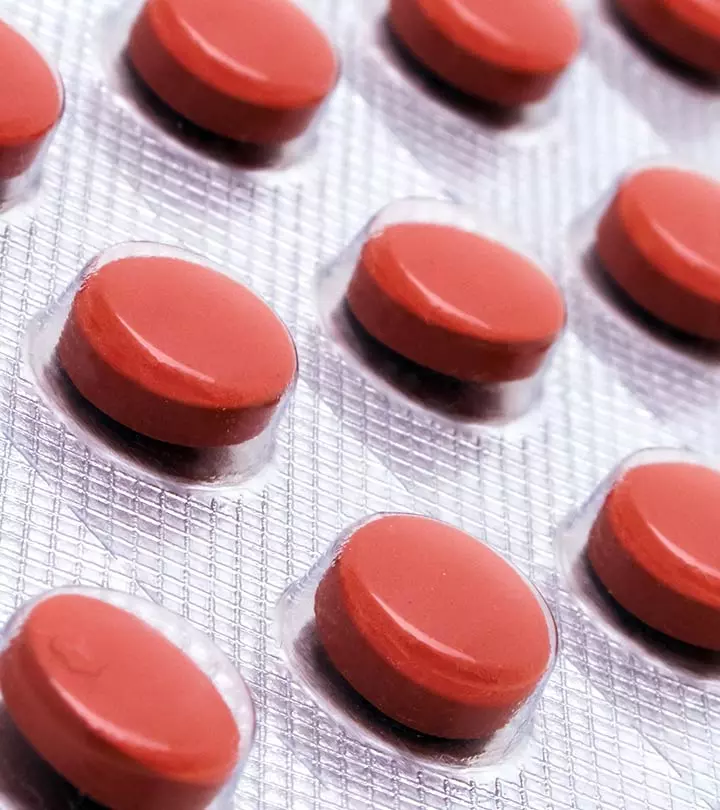Weight Gain Due To Antidepressants: Causes And Treatment
A hormonal imbalance can lead to adding a few pounds, but it can be reversed with ease.

Image: Shutterstock
The role of antidepressants in treating depression and promoting mental health is crucial. But weight gain due to antidepressants is a major side effect of this pharmacological treatment that many people may face. Weight gain is also associated with food habits, sleep duration, lifestyle, and exercise.
But if you observe a weight gain while on antidepressants and worry about it, there is great news for you. This weight can be managed and reversed if you follow certain measures. Keep reading to know what they are and what you need to do for effective weight loss.
In This Article
How Do Antidepressants Cause Weight Gain?

A study conducted in the UK links the use of antidepressants to long-term increased risk of weight gain (1).
SSRIs are antidepressants that inhibit the functioning of serotonin (a chemical produced in the brain that affects the way you feel). This may cause weight gain in the presence of a sedentary lifestyle, smoking, and a Western diet (2).
Lauren, a blogger, shared her distressing experience of gaining weight due to antidepressants. She wrote, “One of the side effects I do experience on antidepressants is weight gain. I am quite short, so I find any weight gain distressing as it is very visible on my frame. I tend to gain it all in my lower abdomen as well which is very frustrating! I have put on at least 4kg since being on antidepressants in the last three months (i).”
Diet plays a key role in losing weight after antidepressant use. We take you through the dietary changes you can make in the next section. Read on!
Key Takeaways
- Weight gain due to antidepressants is one of their major side effects.
- You may gain weight, especially if you smoke and follow a sedentary lifestyle and poor diet.
- According to a study, increasing protein intake and limiting carbs and fats help shed some kilos.
- However, an hour of exercise daily is mandatory to witness desired results.
Role Of Diet In Reversing Weight Gain Due To Antidepressants

The weight gain caused by antidepressants may be reversible to some extent. A diet high in fruit and vegetables may help you lose and maintain weight. A study suggests that substituting carbohydrates and fat with protein and increasing the intake of low-fat dairy may help in losing weight (3). Additionally, you may also have a diet rich in omega-3 fatty acids, like salmon, walnuts, and flaxseeds, as they have been shown to help improve depression and anxiety (4). It may also help with weight management. Incorporating high-fiber foods such as whole grains, legumes, and leafy greens can further aid in weight management by promoting satiety (5). Hence, maintaining a healthy diet is crucial. But, consult a doctor before starting a new diet.
Maintaining a proper diet to lose weight is only a job half done. It should always be complemented with physical exercise. Keep scrolling to know more.
Role Of Exercise In Reversing Weight Gain Due To Antidepressants

Exercise plays a key role in not only losing weight but also maintaining it. Research suggests that people who exercise twice or thrice a week experience significantly lesser depression, anger, and stress (6).
You can start your exercise regimen by walking, a 15-minute jog, brisk walking, and yoga. Gradually increase the exercise duration, which will help you maintain the lost weight. An hour of exercising (especially in the morning) may help boost your mood. However, make sure you also follow a balanced diet.
Learning the reasons for weight gain may help you find an effective management strategy. A few antidepressants may cause weight gain during or after treatment. Let’s have a look at the common antidepressants that may cause weight gain.
Common Antidepressants That May Cause Weight Gain
1. Tricyclic Antidepressants (TCAs)
A few examples of TCAs are:
- Amitriptyline
- Nortriptyline
- Imipramine
- Desipramine
- Dosulepin
- Doxepin
- Clomipramine
Use of TCAs may lead to a minor weight gain between 1 and 5 kg (7).
2. Monoamine Oxidase Inhibitors (MAOIs)
A few types of MAOIs that may cause an upswing in weight include:
- Isocarboxazid
- Phenelzine
- Tranylcypromine
- Moclobemide
Use of MAOIs may result in a weight gain of 1-5 kg (7).
3. Selective Serotonin Reuptake Inhibitors (SSRIs)
SSRIs may result in weight gain when they are taken for extended durations.
The commonly used SSRIs are:
- Citalopram
- Fluoxetine
- Paroxetine
- Sertraline
- Escitalopram
Use of SSRIs may increase bodyweight by 1 to 5 kg (7).
4. Serotonin And Norepinephrine Reuptake Inhibitors (SNRIs)
This class of antidepressants is also used to treat anxiety and chronic pain (long term), specifically nerve pain.
A few examples of SNRIs are:
- Duloxetin
- Venlafaxine
- Levomilnacipran
- Milnacipran
- Desvenlafaxine
Use of SNRIs may see bodyweight go up by 1-2 kg (7).
5. Other Antidepressants
Use of the antidepressants listed below for extended periods may cause drug-induced weight gain, which is one of the medication’s side effects:
- Trazodone
- Nefazodone
- Mirtazapine
- Maprotiline
- Mianserin
These medications may make your bodyweight shoot up by 1-5 kg (7).
 Did You Know?
Did You Know?Depression is hard to deal with. But, the right medication can help you combat it effectively. However, you should also consider other options that may help you deal with depression. Read on to know more!
Other Options For Treating Depression
1. Yoga
Research suggests that yoga is an effective option for reducing depression (8). Start by doing basic asanas for a few minutes a day before moving to more advanced poses and increasing the duration slowly.
2. Aromatherapy
Aromatherapy uses essential oils that are applied to the skin or inhaled. It has the potential to ease the symptoms of depression. Aromatherapy massage has been shown to be more beneficial than inhalation aromatherapy for treating depression (9).
 Quick Tip
Quick Tip3. Psychotherapy

Psychotherapy (talk therapy) involves talking to a therapist regularly. It is a reliable treatment option for people with mild to moderate major depression. In fact, it has been found to be just as effective as antidepressants in these cases (10).
Is there a way for people who are on antidepressant therapy to avoid weight gain? We discuss this in the next section.
How To Avoid Weight Gain When Taking Antidepressant Medication
1. Follow Timely Eating
Planning and timely eating of meals help avoid unnecessary calorie intake. Research shows that this can effectively aid in proper weight management (11). Plan your meals a day in advance and avoid binging on processed or ready-to-eat foods.
2. Include More Protein In Your Diet
Antidepressants may increase hunger and induce craving for carbohydrates (12). Taking more dietary protein may significantly promote weight loss, satiety, beneficial changes in body composition, and reduce food cravings (11). Hence, include protein sources like peanut butter, soy, tofu, chickpeas, and lentils in your meals.
3. Get Sound Sleep

Sleep deprivation may lead to weight gain (14). Therefore, sleeping for a minimum of 8 hours may prevent this change in weight. Avoid daytime naps as it they can affect the sleep quality during the night. If you are habituated to daytime naps, make sure their duration is less than 20 minutes. Also, do not take more than two naps a day.
4. Exercise Regularly
Exercising regularly helps accelerate weight loss, maintain weight, and promote overall health (15). Try switching between different exercises like brisk walking, steps climbing, and jogging to avoid monotony. Start with simple exercises and slowly extend their duration.
5. Increase Fluid Intake
Adequate fluid intake may support weight loss by promoting lipolysis (fat loss) and decreasing food intake (16). But, avoid drinking store-bought fruit juices as they are filled with sugar. But, avoid drinking store-bought fruit juices as they are filled with sugar. Instead, try fresh buttermilk, coconut water, fresh juices, and infused waters with lemon, cucumber, or berries. Although some antidepressants might promote weight gain, they are often effective in treating depression. Common antidepressants that may lead to weight gain include SSRIs, MAOs, TCAs, and SNRIs. However, you can partially reverse this weight gain by eating a healthy diet and exercising regularly. It is also feasible to prevent weight gain due to antidepressants by following some simple guidelines such as eating on time, eating enough protein, getting adequate sleep, doing daily exercise, properly hydrating the body, and avoiding junk and processed food. Before making any changes to your medicines, diet, or physical activity, speak with your doctor.
Note: Before making any of the above changes to your medicines, diet, or physical activity, speak with your doctor. They will help assess your individual needs, consider your mental health and possible medication interactions, and provide guidance tailored to your health goals. Open communication with your healthcare provider is essential to ensure safety and the best possible outcomes.
Infographic: 6 Tips To Avoid Weight Gain When On Antidepressants
Antidepressants help treat depression, but one of their major side effects is weight gain. It is hard to focus on physical health when you are trying to get into a better mental state. The infographic below sheds light on 6 effective tips you can follow to avoid weight gain while on antidepressants. Check it out!

Illustration: StyleCraze Design Team
Frequently Asked Questions
Can you take fat burners while on antidepressants?
Maybe not. While fat burners cause metabolic changes and increase the metabolic rate, the ingredients in these supplements may interfere with the activity of your antidepressants. Consult your doctor before taking any supplements.
Do appetite suppressants work with antidepressants?
Maybe not. Appetite suppressants control your hunger pangs. However, they may interfere with the activity of your antidepressants. Consult your doctor before taking any supplements.
Frequently Asked Questions
Can you take fat burners while on antidepressants?
Maybe not. Fat burners increase your resting metabolic rate. However, the ingredients in these supplements may interfere with the activity of your antidepressants. Consult your doctor before taking any supplements.
Do appetite suppressants work with antidepressants?
Maybe not. Appetite suppressants control your hunger pangs. However, they may interfere with the activity of your antidepressants. Consult your doctor before taking any supplements.
Have you ever wondered why some people experience weight gain while taking antidepressants and mood stabilizers? Watch this video to delve into the science behind this common side effect and make an educated choice.
Personal Experience: Source
StyleCraze's articles are interwoven with authentic personal narratives that provide depth and resonance to our content. Below are the sources of the personal accounts referenced in this article.
i. Antidepressants and weight gainhttps://anourishedmind.wordpress.com/2013/05/18/antidepressants-and-weight-gain/
References
Articles on StyleCraze are backed by verified information from peer-reviewed and academic research papers, reputed organizations, research institutions, and medical associations to ensure accuracy and relevance. Read our editorial policy to learn more.
- Antidepressant utilization and incidence of weight gain during 10 years’ follow-up: population-based cohort study
https://www.bmj.com/content/361/bmj.k1951 - SSRI antidepressant use potentiates weight gain in the context of unhealthy lifestyles: results from a 4-year Australian follow-up study
https://www.ncbi.nlm.nih.gov/labs/pmc/articles/PMC5629701/ - Dietary intakes associated with successful weight loss and maintenance during the Weight Loss Maintenance Trial
https://www.ncbi.nlm.nih.gov/pmc/articles/PMC3225890/ - Food for mood: relevance of nutritional omega-3 fatty acids for depression and anxiety
https://pmc.ncbi.nlm.nih.gov/articles/PMC6087749/ - Unravelling the effects of soluble dietary fibre supplementation on energy intake and perceived satiety in healthy adults: evidence from systematic review and meta-analysis of randomised-controlled trials
https://pmc.ncbi.nlm.nih.gov/articles/PMC6352252/ - Physical exercise and psychological well-being: a population study in Finland
https://pubmed.ncbi.nlm.nih.gov/10642456/ - Drugs That Affect Body Weight, Body Fat Distribution, and Metabolism
https://www.ncbi.nlm.nih.gov/books/NBK537590/ - The Efficacy of Yoga as a Form of Treatment for Depression
https://www.ncbi.nlm.nih.gov/labs/pmc/articles/PMC5871291/ - The Effectiveness of Aromatherapy for Depressive Symptoms: A Systematic Review
https://www.ncbi.nlm.nih.gov/labs/pmc/articles/PMC5241490/ - Managing depression in primary care
https://www.ncbi.nlm.nih.gov/labs/pmc/articles/PMC5563525/ - Timing of Breakfast, Lunch, and Dinner. Effects on Obesity and Metabolic Risk
https://www.ncbi.nlm.nih.gov/labs/pmc/articles/PMC6893547/ - Body Weight Changes Associated With Psychopharmacology
https://psychiatryonline.org/doi/10.1176/appi.ps.53.7.842 - Increased Dietary Protein as a Dietary Strategy to Prevent and/or Treat Obesity
https://www.ncbi.nlm.nih.gov/labs/pmc/articles/PMC6179508/ - Sleep and obesity
https://www.ncbi.nlm.nih.gov/labs/pmc/articles/PMC3632337/ - Physical Activity Plays an Important Role in Body Weight Regulation
https://www.hindawi.com/journals/jobe/2011/360257/ - Increased Hydration Can Be Associated with Weight Loss
https://www.ncbi.nlm.nih.gov/labs/pmc/articles/PMC4901052/
Read full bio of Ritika Dass
Read full bio of Aparna Mallampalli
Read full bio of Arshiya Syeda
Read full bio of Payal Karnik


















Community Experiences
Join the conversation and become a part of our empowering community! Share your stories, experiences, and insights to connect with other beauty, lifestyle, and health enthusiasts.